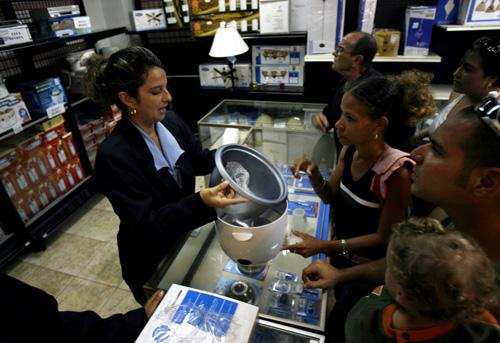Cuban government makes consumer goods available

A vendor shows shoppers an electric rice maker at a store in Havana, on Tuesday. Cuban shoppers are snapping up items up DVD players, motorbikes and electric rice cookers that are on sale to the general public for the first time after the government of ne Javier Galeano, The Associated Press
Apr 2, 2008
Last updated on May 12, 2016 at 11:30 p.m.
HAVANA – Cubans snapped up DVD players, motorbikes and pressure cookers for the first time Tuesday as Raul Castro’s new government loosened controls on consumer goods and invited private farmers to plant tobacco, coffee and other crops on unused state land.
Combined with other reforms announced in recent days, the measures suggest real changes are being driven by the new president, who vowed when he took over from his brother Fidel to remove some of the more irksome limitations on the daily lives of Cubans.
Analysts wondered how far the communist government is willing to go.
“Cuban people can’t survive on the salaries people are paying them. Average men and women have been screaming that at the top of their lungs for many years,” said Felix Masud-Piloto, director of the Center for Latino Research at DePaul University. “Now after many years, the government is listening.”
Get The Daily Illini in your inbox!
Many of the shoppers filling stores Tuesday lamented the fact that the goods are unaffordable on the government salaries they earn. But that didn’t stop them from lining up to see electronic gadgets previously available only to foreigners and companies.
“They should have done this a long time ago,” one man said as he left a store with a red and silver electric motorbike that cost $814.
On Monday, the Tourism Ministry announced that any Cuban with enough money can now stay in luxury hotels and rent cars, doing away with restrictions that made ordinary people feel like second-class citizens. And last week, Cuba said citizens will be able to get cell phones legally in their own names, a luxury long reserved for the lucky few.
The land initiative, however, potentially could put more food on the table of all Cubans and bring in currency from exports of tobacco, coffee and other products, providing the cash inflows needed to spur a new consumer economy.
Government television said 51 percent of arable land is underused or fallow, and officials are transferring some of it to individual farmers and associations representing small, private producers. According to official figures, cooperatives already control 35 percent of arable land – and produce 60 percent of the island’s agricultural output.
“Everyone who wants to produce tobacco will be given land to produce tobacco, and it will be the same with coffee,” said Orlando Lugo, president of Cuba’s national farmers association.
The change is a sharp contrast to the early days of Cuba’s revolution, when the government forced or encouraged private farmers to turn their land over to the state or form government-controlled collective farms. But without more details, it was difficult to tell the significance of program, which began last year but was announced only this week.
“If this means all land that’s not being used, like for private farmers, cooperatives and state farms, is available, that’s positive,” said Carmelo Mesa-Lago, a Cuba economics expert at the University of Pittsburgh. “Assuming, of course, they have the freedom to sow and sell whatever they want.”
Lines formed before the doors opened at the Galerias Paseos shopping center on Havana’s famed seaside Malecon boulevard, and shoppers wasted little time once inside. But there was no sign yet of computers and microwaves, highly anticipated items that clerks across Havana insisted would appear soon on store shelves, with desktop computers retailing for around $650.
Cuba’s communist system was founded on promoting social and economic equality, but that doesn’t mean Cubans can’t have DVD players, said Mercedes Orta, who rushed to gawk at the new products.
“Socialism has nothing to do with living comfortably,” she said.
Lines outside electronics boutiques and specialty shops are common in Cuba because guards limit how many people can be inside at a time. But waits were longer and aisles more packed than usual at Havana’s best-known stores.
“DVDs are over there, down that aisle,” an employee in a white short-sleeved shirt repeated over and over as shoppers wandered into La Copa, an electronics and grocery store across from the Copacabana Hotel.
“Very good! DVD players on sale for everybody,” exclaimed Clara, an elderly woman peering at a black JVC console. “Of course nobody has the money to buy them.” Like many Cubans, Clara chatted freely but wouldn’t give her full name to a foreign reporter.
Government stores offered all products in convertible pesos – hard currency worth 24 times the regular pesos state employees get paid. The government controls well over 90 percent of the economy and the average state salary is just 408 regular pesos a month, about $19.50.
Still, most Cubans have access to at least some convertible pesos thanks to jobs with foreign firms or in tourism, or cash sent by relatives living in the United States.
Graciela Jaime, a 68-year-old retired clothes factory employee, complained that widespread corruption and greed has created a class of rich Cubans.
“Everyone wants to spend money and that is what’s happening,” she said. “If everything they earned went to the state like it should, there wouldn’t be as much corruption as there is.”
Associated Press writer Katherine Corcoran in Mexico City contributed to this report





